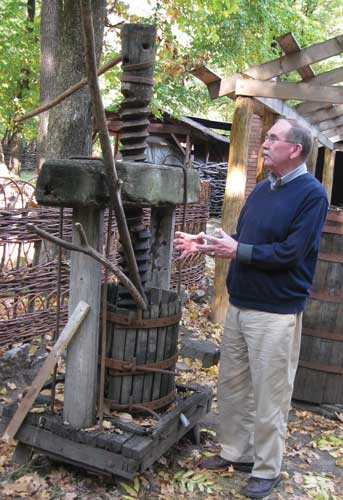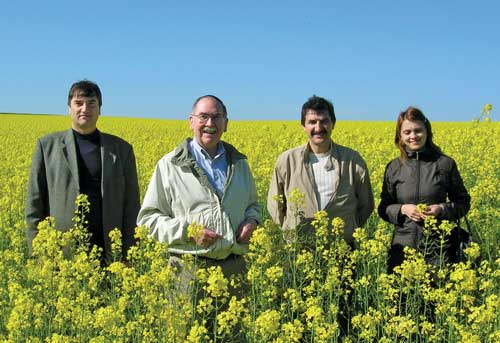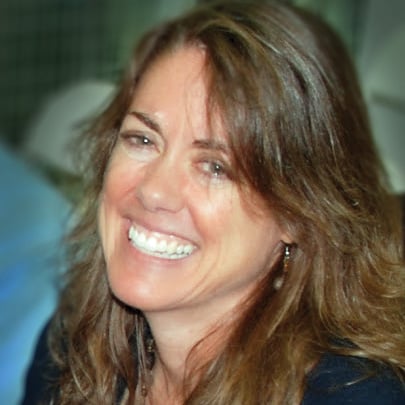A Tribute to Peter Clark— A Leader in Food Processing
PROCESSING
 Many of you already know that J. Peter Clark III passed away on June 4, 2015. Peter was a contributing editor to Food Technology magazine from 2002 until 2015. During these 13 years, he wrote more than 100 informative and thought-provoking food processing columns, one per month. In honor of his contributions to Food Technology magazine and the field of food processing, this month’s column will be dedicated to Peter. Special thanks go to John M. Krochta, a close friend and colleague of Peter’s, who co-wrote this column.
Many of you already know that J. Peter Clark III passed away on June 4, 2015. Peter was a contributing editor to Food Technology magazine from 2002 until 2015. During these 13 years, he wrote more than 100 informative and thought-provoking food processing columns, one per month. In honor of his contributions to Food Technology magazine and the field of food processing, this month’s column will be dedicated to Peter. Special thanks go to John M. Krochta, a close friend and colleague of Peter’s, who co-wrote this column.
Peter was a giant in the field of food processing. His educational background was in chemical engineering; he received his BS in 1964 from the University of Notre Dame and his PhD in 1968 from the University of California, Berkeley. His PhD professor was C. Judson King, an innovator in food engineering research, teaching, and university administration. Dr. King encouraged and enabled Peter’s interest in new processes and how they could be created by suggesting Peter orient his research on freeze-drying toward a systematic invention of a new freeze-drying process. The result was a new invention involving circulation of a carrier gas at low pressure through alternating layers of frozen material and a desiccant, with the carrier taking sublimed water vapor from the frozen material to the desiccant and carrying the heat of sublimation from the desiccant to the frozen material.
Early Research Projects
The support for that project on freeze-drying came from Arthur I. Morgan, director of the Western Regional Research Center (WRRC) of the U.S. Dept. of Agriculture (USDA) Agricultural Research Service (ARS). Seeing Peter’s unique abilities, Dr. Morgan hired Peter after he completed his PhD. While at WRRC, Peter worked with George Robertson in creating a green chemistry process. An existing process used organic solvents and had low yield. Peter and George figured out how to replace the organic solvents with water along with scaling up the process and producing product for testing. Peter’s experience with creating a new freeze-drying technology in graduate school and a new green process at WRRC whet his appetite for more challenges. After a time at WRRC, Peter moved on to the national program staff of the ARS in Washington, D.C
Peter Clark was one of those rare individuals who excelled in government, academia, and the private sector. After his time with USDA-ARS, he joined the faculty of the Virginia Polytechnic Institute and State University (Virginia Tech), where he taught and conducted research for six years and achieved tenure. Then, again seeking new challenges, Peter moved to the private sector, where he served as director of research for ITT Continental Baking Co. One of Peter’s favorite projects was working on commercialization of the retort pouch. Peter had additional experience in industry, serving as president of Epstein Process Engineering and vice-president for technology of Fluor-Daniel. Then, as a culmination of his unique experiences in government, academia, and industry, Peter began a long and illustrious career as a process engineering consultant, a position in which he excelled and provided valuable input to many companies, countries, and other organizations.
A Diversified Consulting Career
Peter’s experience in government and academic research along with commercial processes and products formed a solid foundation for consulting on a broad range of issues. These included processing technologies such as spray-drying, refrigeration, mixing, and separation processes, as well as plant design for a large number of food and pharmaceutical companies. Peter led teams that designed and built award-winning plants for companies such as Post, Carnation, and Hill’s Pet Nutrition. During his consulting career, Peter also became involved in a number of food safety issues, including E. coli and Listeria outbreaks. As a consultant, Peter helped food companies adopt the regulations stemming from the Food Safety Modernization Act (FSMA) of 2011. The FSMA requires food companies to have a formalized food safety plan that is similar to a Hazard Analysis Critical Control Point (HACCP) plan. In particular, the fresh produce industry has upgraded many practices to operate in environments with rigid sanitation practices. This has been especially challenging with imported fruits and vegetables, which constitute a large fraction of total fruit and vegetable consumption in the United States. Peter indicated to colleagues that, in working with hundreds of companies, he learned all were obsessed with improving the safety of their processes and products.
Peter’s consulting work resulted in both breakthroughs and incremental improvements in food technologies. Most commonly, he assisted with reducing costs and/or improving productivity and quality. An impactful example was reversing the order of commercial baby food production from whole fruit or vegetable cooking followed by pureeing to chopping or pureeing first followed by cooking. The result was improved quality and nutritional value with reduced cooking time and energy.
 A Global Traveler
A Global Traveler
Peter may have been the most traveled food processing engineer ever. He had professional and volunteer trips to more than 40 countries, including Albania, China, Egypt, Germany, Haiti, Honduras, India, Israel, Kenya, Malawi, Moldova, and Uzbekistan. He shared his expertise internationally as a volunteer promoting food safety and processing under the USAID Farmer to Farmer program in Malawi and Moldova, and as a paid advisor in Albania, India, and Egypt. Peter also worked along with relief organizations in Haiti after that country’s devastating earthquake in 2010. His project involved better utilization of Haiti’s mango trees, which had been commonly utilized for firewood. Since only 30% of the mangoes were of a quality suitable for export, Peter’s work focused on improving productivity in drying mangoes, with the goal of improving farmer income. Peter found special satisfaction in helping governments and entrepreneurs in developing countries better utilize their agriculture to produce value-added food products for both domestic and export markets.
Throughout his career, Peter was active in professional organizations. He was a registered professional engineer in Illinois and Virginia. He was an IFT Fellow and served as chair of the IFT Food Engineering Division and New Products and Technologies Committee. Peter also served as chair of the American Institute of Chemical Engineers (AIChE) Food, Pharmaceutical and Bioengineering Division and was selected for the Division Award in 1998. In 2010 he received the AIChE Chicago Section Ernest W. Thiele Award. Besides IFT and AIChE, Peter was also a member of the American Society of Biological and Agricultural Engineers, American Association of Cereal Chemists, and American Association of Candy Technologists. Peter was a volunteer with AllExperts since 2001, answering over 1,000 questions dealing with food processing during that time. In addition, Peter was the recipient of the Life Achievement Award from the International Association of Engineering and Food in 2011.
Peter also provided long-term support for food process engineering education. He served as chair of the University of California, Davis, Food Engineering Advisory Council, which provided important input to teaching and research programs. Peter served in a similar capacity at the University of Illinois.
J. Peter Clark III had a positive impact on all who met and knew him. He leaves a strong legacy of contributions to the food industry, food processing education, food safety, and developing country food sectors. Included in that legacy are 40 published papers and eight authored or coauthored books. Included among the books are the following, which share Peter’s vast experience and accomplishments: Practical Ethics for Food Professionals: Ethics in Research, Education and the Workplace (J. Peter Clark and Christopher Ritson), IFT Press, Wiley-Blackwell, 2013; Case Studies in Food Engineering: Learning from Experience (J. Peter Clark), Springer Science+Business Media, 2009; Practical Design, Construction and Operation of Food Facilities (J. Peter Clark), Academic Press, 2008; and Food Processing Operations and Scale-up (Kenneth J. Valentas, Leon Levine, and J. Peter Clark), Marcel Dekker, 1990.
A side of Peter that few knew was his service to the hungry in his own community. Peter served as president of the board and a volunteer at the Oak Park River Forest Food Pantry. Also, Peter and his wife, Nancy, were enthusiastic supporters and benefactors of the folk music community, regularly hosting traveling musicians in their home. Always the educator, Peter was reported to regularly discuss food production and processing issues with the musicians.
Peter and Nancy shared a joie de vivre that was palpable to everyone who met them. In addition, Peter’s thoughtfulness, wisdom, and caring nature served him in his many roles in life. John Quincy Adams once said, “If your actions inspire others to dream more, learn more, do more, and become more, you are a leader.” Peter inspired many to dream more, learn more, do more, and become more, and was a true leader, both professionally and personally. In these ways, he lives on in each of us who knew him.
With gratitude to Dr. J. Peter Clark III.
 Tara McHugh, PhD, Contributing Editor
Tara McHugh, PhD, Contributing Editor
Research Leader, USDA Agricultural
Research Service, Albany, Calif.
[email protected]
John M. Krochta, PhD, is professor emeritus of the University of California, Davis ([email protected])


